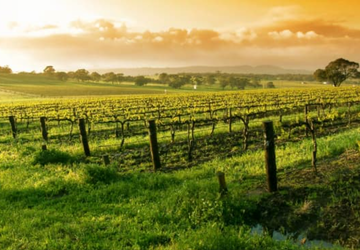How to Buy a Vineyard: A Complete Guide
Buying a vineyard isn't just a real estate venture; it's a dream come true for many wine enthusiasts. The idea of owning your piece of picturesque vine-covered land, producing your wine, and watching your grapes mature into a fine vintage is undeniably appealing. The allure of becoming a part of the time-honored winemaking tradition can be irresistible, drawing you into a world where the earth and the elements shape the exquisite flavors in each bottle.
But it's not all romantic sunsets and wine tastings; there's a lot of practicality involved in purchasing a vineyard. In this guide, we'll walk you through the steps to make your vineyard dream a reality. So, as you embark on this remarkable pursuit, be ready for both the enchantment and the elbow grease that comes with owning your slice of wine country heaven.
1. Define Your Goals
Before diving into the vineyard-buying process, take a moment to clarify your goals. Are you looking to make wine commercially, as a hobby, or as an investment? Understanding your objectives will guide your decisions throughout the process.
You can focus on a smaller vineyard if it's a hobby or personal retreat. However, if you plan to produce wine commercially, you'll need a more substantial plot with the right grape varieties.
2. Determine Your Budget

Establishing a budget is crucial. The cost of purchasing a vineyard can vary widely based on location, size, and vineyard condition. Beyond the purchase price, consider ongoing costs like maintenance, labor, and potential upgrades.
Factor in a buffer for unexpected expenses, as vineyards can be unpredictable. It's essential to be financially prepared for the long-term commitment of vineyard ownership.
3. Location Matters
Location is paramount when buying a vineyard. Different grape varieties thrive in specific climates and soil types. Research which regions are known for producing the type of wine you want. Factors like altitude, temperature, and rainfall significantly influence grape quality.
Visit potential locations and talk to local winemakers to understand the area's suitability for vineyard operations. A well-chosen location can significantly impact the success of your vineyard.
4. Conduct Thorough Research
Once you've identified potential locations, it's time for in-depth research. Learn about the local wine industry, vineyard regulations, and zoning laws. Understanding the legal aspects and potential restrictions is crucial.
Inspect the soil quality, drainage, and topography of the land. These factors affect grape growth and vineyard management. Hiring a local expert or consultant can provide valuable insights during this phase.
5. Grape Variety Selection
Selecting the right grape varieties is pivotal to your vineyard's success. The choice depends on your goals and the region's suitability. Consult with local viticulturists to determine which grape varieties thrive in your chosen location. They have a deep understanding of the microclimates and terroir, guiding you toward grapes that will flourish in your soil and climate.
Consider red and white grape varieties, as diversity can enhance your wine offerings, appealing to a broader range of wine enthusiasts. You can start with a few varieties and expand over time as you gain experience, gradually perfecting your craft and diversifying your wine portfolio.
6. Vineyard Condition and Equipment
Evaluate the condition of the existing vineyard, if any, with a discerning eye. It's important to assess the health of the vines, trellising systems, and irrigation infrastructure. Consider the age of the vines, as older vines may yield unique flavors but may also require more care. Renovating or replanting a vineyard can be costly, so factor this into your budget and long-term plans.
Additionally, take stock of essential equipment like tractors, harvesters, and fermentation tanks. Calculate the costs of acquiring or maintaining this equipment to ensure a smooth operation from vine to bottle.
7. Seek Professional Help
Buying a vineyard is a complex process, and seeking professional assistance is wise. Hire a real estate agent experienced in vineyard transactions. They can help you navigate the legalities and intricacies of purchasing vineyard property, from land use regulations to water rights.
Consulting with a viticulturist and winemaker can provide valuable insights into the vineyard's potential and any necessary improvements. They can help you assess soil quality, recommend grape varieties, and even offer advice on sustainable and organic vineyard practices, setting the stage for a thriving vineyard.
8. Conduct Due Diligence
Perform a thorough due diligence process before finalizing the purchase, leaving no grapevine unturned. This includes soil testing, inspecting the property for pests and diseases, and reviewing any existing contracts or agreements related to the vineyard.
Engaging experts in these areas ensures a comprehensive inspection to help you identify potential challenges and negotiate the best deal possible. Remember, meticulously examining the vineyard's health and legal standing can prevent costly surprises down the road, preserving your investment.
9. Negotiate the Purchase
Once you're satisfied with the property and have all the necessary information, it's time to negotiate the purchase. Work closely with your real estate agent to determine a fair price based on market conditions, property conditions, and potential future investments.
Consider including contingencies in the purchase agreement to protect your interests, such as provisions for repairs or improvements if needed. Negotiation is a delicate dance, and finding a balance between securing a reasonable price and ensuring a smooth transaction is key to a successful vineyard acquisition.
10. Plan for the Future

Owning a vineyard is a long-term commitment that requires careful planning. Develop a clear business plan that outlines your goals, budget, and marketing strategy. Determine whether you'll handle vineyard management and winemaking yourself or hire professionals. Weigh the pros and cons, considering your level of expertise and available time.
Moreover, consider joining local winemaker associations and building relationships within the industry. Networking can be invaluable for advice, support, and collaborations, helping you navigate the dynamic world of wine production and find your place among passionate vintners.
Conclusion
Buying a vineyard is an exciting venture but requires careful planning and research. Take the time to define your goals, set a budget, and thoroughly investigate potential locations. Seek professional advice, conduct due diligence, and negotiate wisely. Dedication and the right approach can turn your vineyard dream into a flourishing reality. Cheers to your future as a vineyard owner!










